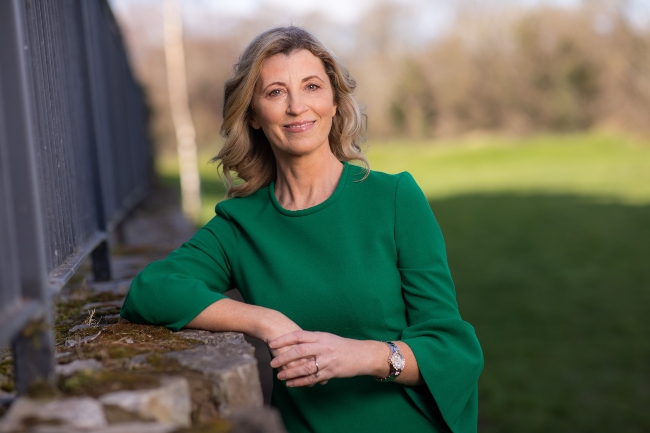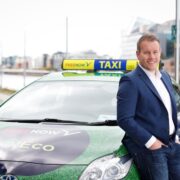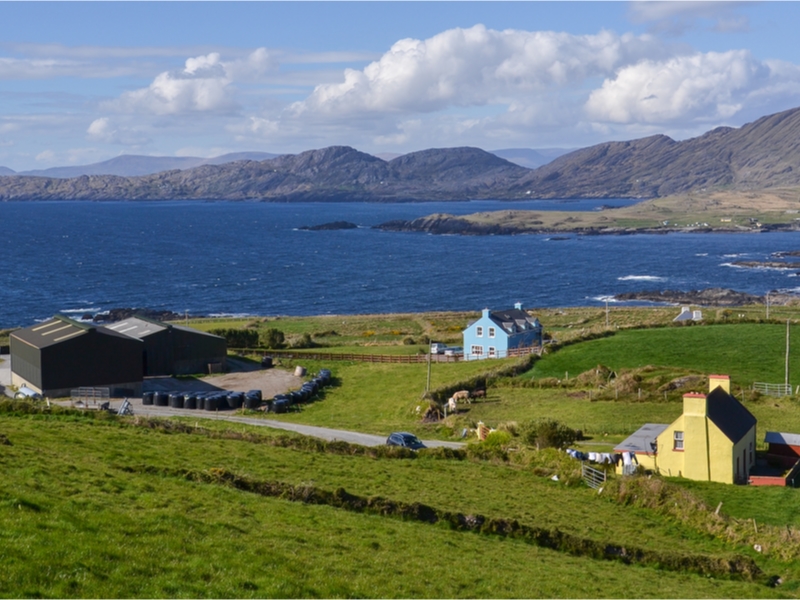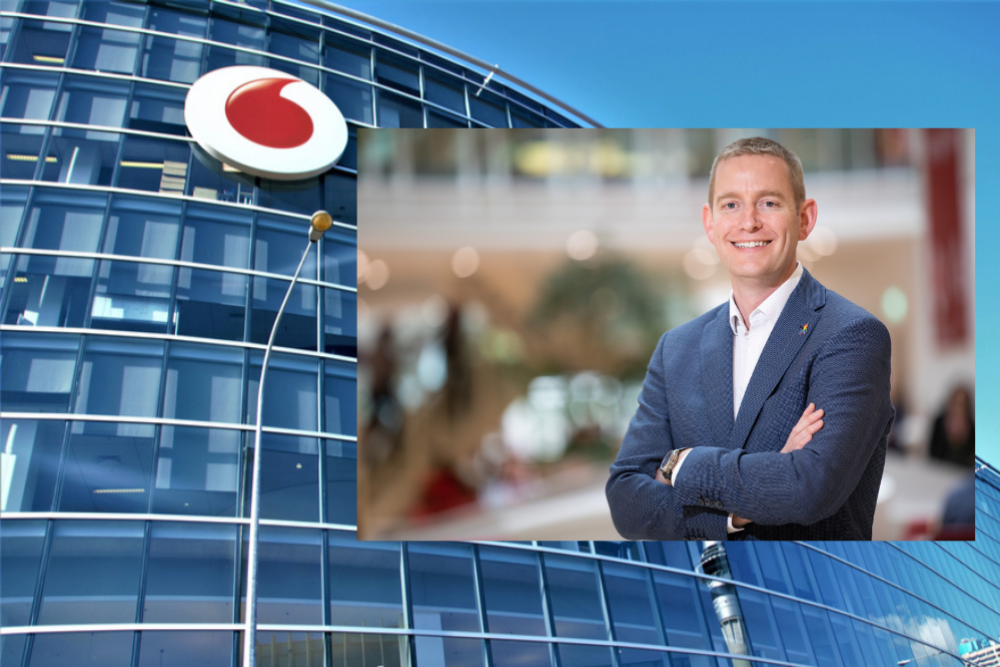Vodafone Ireland’s managing director of Business Sinéad Bryan says the rate of digital transformation among Irish businesses since the pandemic began has been unprecedented.
As Sinéad Bryan recalls, the week before Ireland went into its first lockdown in March 2020, mobile and fixed line telecoms operator Vodafone did a company-wide test of how resilient its systems would be if everyone worked from home. Suspecting something was coming, it proved to be the right move.
A week later the entire company, along with the rest of the Irish economy and economies across the world, sent all of its staff home. Like many companies, Vodafone found its entire culture and modus operandi transformed and has since emerged as a champion of hybrid working with a 60:40 hybrid model that will see all of its workers spend 60pc of their time working remotely and 40pc working in teams at the office. For Vodafone the experience has been a true test of the products and technologies it provides businesses, from smartphones to broadband and entire systems in the cloud.
“It is crucial that we help businesses to realise their digital ambitions by making it accessible to them. We’ve seen so much resilience and the ability to pivot their businesses has been inspirational”
The pace has continued unabated and the entire business landscape has been digitalised. “This is transformation in its truest sense. Digital transformation journeys we had planned for the next two to three years were condensed into 12 months.”
Business facing
Bryan recently transitioned into the role of director of business from her previous role as chief financial officer. She joined Vodafone in 2013 following a 13-year career with software giant Oracle.
“The conversation around security was absolutely intrinsic over the past 18 months”
Vodafone has been in the Irish market since 2001 and has 2.3m customers spanning its various mobile, landline, broadband, cloud and TV services. It employs 1,200 people at its Dublin headquarters and at various stores around Ireland.
Prior to joining Oracle, Bryan had a formulative experience working at Samir Naji’s Horizon technology business as financial controller overseeing six different business units. The tech and telecoms downturn that followed 9-11 in 2001 was a baptism of sorts. “I experienced two extremes; extreme growth and an extreme decline within a very short period. It was really my first big role, when I look back it was definitely one of the standout worlds in terms of the learnings on what I do differently.”
Additional lifelong skills were gained when she joined Oracle in Dublin, rapidly escalating the ranks to take on senior business and leadership roles. “It was a time when Oracle was going through a significant business transformation and I ended up spending a lot of time with customers talking to them about the transformation. I loved the pace of change and transformation at Oracle, which went on to buy PeopleSoft at the time before going on to acquire 120 more companies.”
It was at this time that Bryan found her feet and realised that her newfound penchant for solving customer problems dovetailed perfectly with her financial and leadership skills.
“I loved being out with customers and finding out what worked, what didn’t and what we needed to do differently in the future.
“I found that I had an ability to spend time with businesses figuring out what change would mean for their business, managing that change and seeing the bigger picture. This meant simplifying processes and seeing what technologies worked best. It was very much a business conversation because my skills were financial rather than technological. It was really about enabling the business and not about the technology itself. I always look for the opportunities to be customer facing.”
Her grounding in finance, fascination with transformation and fluency in technology have prepared Bryan well for the world we are in today as firms look to the post-pandemic future and few people have the answers.
Digital transformation is happening

Vodafone Ireland director of Business Sinéad Bryan
One thing is certain. Every business is now a digital business. “CFOs and finance directors need to have a broader knowledge of what’s happening and a deeper knowledge and understanding of digital and technology. Understanding data, for example, is critical. I would see the role of a CFO as being the co-pilot to the CEO and definitely that’s been my experience. I love leading people through the transformation and how technology can be an enabler for a business to make a bold leap forward.”
Another draw for Bryan to join Vodafone when she did was the culture and the fact that more than 50pc of the leadership team was female. “I was a mother of two young kids and the principle of bringing your whole self to work too appealed to me. It was important to me. I wanted to be the best mother in the world, but I also wanted to be the best professional that I could be as well.”
After a stint as chief financial officer of Vodafone in Ireland, an opportunity arose for Bryan to take on the B2B side of Vodafone’s business, a territory she was already familiar with. Only a month into the role, the pandemic hit and Vodafone had the twin challenge of transforming itself and helping its customers to transform too.
“The first thing we had to do was help our customers to mobilise and get their teams up and running and functioning from home. The connectivity in the form of our mobile and broadband networks was absolutely critical to that. We work with everyone from small businesses to government departments and multinationals. The conversation around security was absolutely intrinsic over the past 18 months. We have a very strong partnership with the HSE and provided the connectivity for their testing centres and vaccination centres across the country. We were completing work in a very short period of time that previously would have taken weeks.”
As an telecoms operator, the demands on its networks were immense. “We saw a massive surge in the use of our networks. Our mobile data volumes during the working week increased by 50pc and fixed data by 60pc. We had to add additional capacity to ensure that people continued to effectively work from home.”
Crucial to delivery was leveraging the global scale of Vodafone. “It was about ensuring our customers continued to have that seamless experience. I think high-speed gigabit broadband is now part of our everyday language at work. My friends who previously weren’t interested in what I did are now all of a sudden very interested. Because that connectivity kept us all working and talking to friends and family for the past 18 months.”
Resilience and promise of Irish SMEs
But what has impressed Bryan the most during these pandemic times has been the Irish SME. “The amazing resilience we saw from SME organisations has been outstanding.”
She cites the example of Tallaght business the Flying Elephant which made bespoke concert furniture. When the lockdown began its business was substantially impacted but very quickly it pivoted to making custom home office furniture as well as garden furniture.
Another example is Killarney, Co Kerry-based events business Elite Events Management that that found itself on the brink due to Covid-19 and pivoted to launch a new sport and fitness tracking app called HotFoot as part of a pivot from mass participation sports events into the sports tech space.
“Transformation is generally about making your business more efficient. But this was transformation in the truest sense of creating a completely new business model.
“And even among established, larger companies, what we have seen is the acceleration of digital adoption.
“But we have a lot more to do in terms of digital transformation, particularly in the SME sector.”
A study of 500 rural and urban SMEs across a range of industries into how firms adapted during the pandemic found that digital transformation will play a key role in any post-Covid recovery. The Red C study, led by University of Limerick Associate Professor of Economics Stephen Kinsella, found that Ireland has one of the lowest level of SME digital adoption in the EU. Just 30pc of small firms in Ireland sell via the internet, versus 38pc for larger firms and way behind counterparts like Denmark, Malta, Finland and Hungary. A quarter of SMEs lack confidence in the digital skills of their employees and almost half plan to invest in digital skills and training. This rises to 65pc for larger SMEs.
“I think we [Vodafone] have a lot more work to do in terms of partnering with our small businesses to help them to transform. Our study showed that cost continues to be one of the biggest hurdles to digital adoption and trust in their suppliers was also high in their considerations. In the post-pandemic era, it will be vitally important to continue to work with SMEs to help in their digital transformation.
“It is crucial that we help businesses to realise their digital ambitions by making it accessible to them. We’ve seen so much resilience and the ability to pivot their businesses has been inspirational. Whether that means mobilising their teams to work from home or actually changing their business model or adopting new technologies within a really accelerated period of time, it’s been amazing to see.
“But I think we have more work to do,” Bryan concluded. “We started the journey now. And I think we just need to drive on.”
-
Bank of Ireland is welcoming new customers every day – funding investments, working capital and expansions across multiple sectors. To learn more, click here
-
Listen to the ThinkBusiness Podcast for business insights and inspiration. All episodes are here. You can also listen to the Podcast on:
-
Spotify
-
SoundCloud
-
Apple




